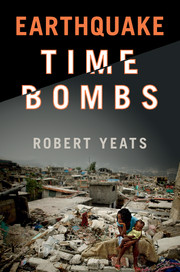Book contents
- Frontmatter
- Contents
- Acknowledgments
- Why this book?
- PART I EARTHQUAKES, DEEP TIME, AND THE POPULATION EXPLOSION
- PART II EARTHQUAKE TIME BOMBS
- TIME BOMBS WHERE THE PROBLEM IS UNDERSTOOD, BUT THE RESPONSE IS STILL INADEQUATE
- OTHER TIME BOMBS, INCLUDING CITIES THAT ARE NOT WELL PREPARED
- 13 Age of Enlightenment and the 1755 Lisbon earthquake
- 14 Jerusalem: earthquakes in the Holy Land
- 15 Istanbul: responding to an official earthquake warning
- 16 Tehran: the next earthquake in the Islamic Republic of Iran?
- 17 Kabul: decades of war and Babur's warning
- 18 Earthquakes in the Himalaya
- 19 Myanmar and the Sagaing fault
- 20 Metro Manila, the Philippines
- 21 Lima, Peru: Inca earthquake-resistant construction and a bogus American earthquake prediction
- 22 Andean earthquakes in Quito and Guayaquil, Ecuador
- 23 Caracas: lots of oil, but little interest in earthquakes
- 24 Haiti, which lost its gamble, and Jamaica and Cuba (not yet)
- 25 Mexico City: bowl of jello inherited from the Aztecs
- 26 Central America and the earthquake that brought down a dictator
- 27 East African Rift Valley: a tale of two cities
- PART III SUMMARY AND RECOMMENDATIONS
- References
- Index
14 - Jerusalem: earthquakes in the Holy Land
from OTHER TIME BOMBS, INCLUDING CITIES THAT ARE NOT WELL PREPARED
Published online by Cambridge University Press: 05 November 2015
- Frontmatter
- Contents
- Acknowledgments
- Why this book?
- PART I EARTHQUAKES, DEEP TIME, AND THE POPULATION EXPLOSION
- PART II EARTHQUAKE TIME BOMBS
- TIME BOMBS WHERE THE PROBLEM IS UNDERSTOOD, BUT THE RESPONSE IS STILL INADEQUATE
- OTHER TIME BOMBS, INCLUDING CITIES THAT ARE NOT WELL PREPARED
- 13 Age of Enlightenment and the 1755 Lisbon earthquake
- 14 Jerusalem: earthquakes in the Holy Land
- 15 Istanbul: responding to an official earthquake warning
- 16 Tehran: the next earthquake in the Islamic Republic of Iran?
- 17 Kabul: decades of war and Babur's warning
- 18 Earthquakes in the Himalaya
- 19 Myanmar and the Sagaing fault
- 20 Metro Manila, the Philippines
- 21 Lima, Peru: Inca earthquake-resistant construction and a bogus American earthquake prediction
- 22 Andean earthquakes in Quito and Guayaquil, Ecuador
- 23 Caracas: lots of oil, but little interest in earthquakes
- 24 Haiti, which lost its gamble, and Jamaica and Cuba (not yet)
- 25 Mexico City: bowl of jello inherited from the Aztecs
- 26 Central America and the earthquake that brought down a dictator
- 27 East African Rift Valley: a tale of two cities
- PART III SUMMARY AND RECOMMENDATIONS
- References
- Index
Summary
INTRODUCTION
The preceding chapters on China and the Age of Enlightenment focused on the destruction of a major city, Xi'an, with millions of inhabitants four and a half centuries ago and the destruction of another major city, Lisbon, in 1755. This chapter steps farther back in time to discuss earthquakes in Israel/Palestine, including some that took place more than 3000 years ago. The population of Jerusalem is estimated as 25,000 in the days of King Solomon in the tenth century BC, 60,000 in AD 70, 30,000 in AD 1130, and fewer than 9000 in AD 1800. The population began to grow in the nineteenth century, but was still only 164,000 in 1946, two years before the establishment of the State of Israel. This means that earthquake losses throughout history in Jerusalem have not been related to a population explosion. The rapid increase in population did not start until after World War II, and only recently has the population of Jerusalem risen to the level of hundreds of thousands. Jerusalem's date with its next earthquake, when many people will be killed, is still in the future.
I include the city of Jerusalem as a time bomb because it is sacred to three of the world's great religions, giving it a prominence far greater than its population of three-quarters of a million would otherwise justify. About two-thirds of its population are Jewish, and nearly all the rest are Arabs, mainly Muslim, but also Christian. The higher birth rate among Arab families and the departure of secular Jews from the city result in a growing percentage of Arabs in Jerusalem's population, although this trend could reverse itself because more ultra-Orthodox Jewish families, also with high birth rates, are moving into the city.
A major social problem is that both Israel and the Palestinian Authority claim Jerusalem as their capital, and at present, despite peace talks over the years, there is no compromise to share the city that would lead to an Arab–Israeli peace. A wall has been built between Arab communities and housing developments for Jewish settlers within the West Bank. Commentators worry about the possibility of a new intifada, or uprising, if no peace agreement is reached. Renewed violence is assured if extremist Jewish parties take control of the government and attempt to annex the West Bank to Israel.
- Type
- Chapter
- Information
- Earthquake Time Bombs , pp. 164 - 178Publisher: Cambridge University PressPrint publication year: 2015



